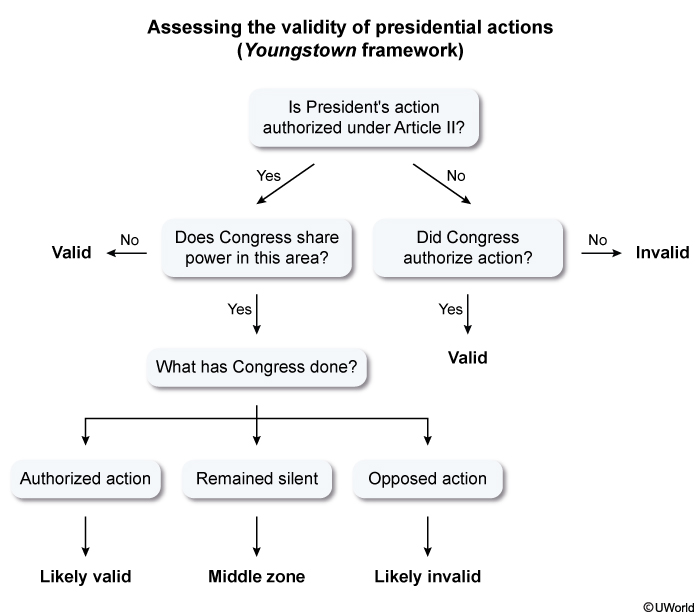In response to a terrorist attack that occurred within the United States, Congress authorized the President to use military force against nations, organizations, and persons the President determined were responsible for the attack. Pursuant to this authorization, enemy combatants were seized in a foreign country and transported to a foreign location under the de facto control of the United States, which was well outside the area of military activity. The President ordered that a military tribunal be convened in that location to try the enemy combatants.
Prior to the attack, Congress, pursuant to its constitutional authority, had authorized the use of military tribunals and set out procedures to guarantee specific basic rights that the tribunals must provide, such as the right of a defendant to hear the evidence against him. The procedural rules for the military tribunal established by the presidential order did not provide for those basic rights.
Does the President have the constitutional authority to convene this military tribunal?
A) No, because a military tribunal only has power over current members of the U.S. armed forces. [0%]
B) No, because the procedures adopted for the President's military tribunal conflict with the procedures adopted by Congress. [45%]
C) Yes, because Congress authorized the President to use military force that led to the seizure of the enemy combatants. [24%]
D) Yes, because the President has plenary power over military tribunals as commander in chief. [30%]
Explanation
Article II grants the President constitutional authority over a wide range of domestic and foreign policy areas, including serving as commander in chief of the U.S. military. Congress also has authority over military matters, including the power to establish military courts and tribunals. When these coequal branches of government share power, the Youngstown framework determines whether the President acted within his/her constitutional authority. This framework considers whether there was congressional:
- authorization – in which case the President had maximum authority to act and that act is likely valid
- silence – in which case the act is valid so long as it (1) fell within the President’s Article II powers and (2) did not interfere with another branch’s powers or
- opposition – in which case the President had minimal authority to act and that act is likely invalid.
Here, Congress authorized the use of military tribunals and set out procedures to guarantee defendants specific basic rights. However, these rights were not included in the President’s executive order that provided procedural rules for a tribunal to try certain enemy combatants. Since the congressional authorization and the executive order are in opposition, the President does not have the constitutional authority to convene this military tribunal.
(Choice A) A military tribunal can exercise jurisdiction over current members of the U.S. armed forces as well as enemy combatants and enemy civilians.
(Choice C) Although Congress authorized the President to use military force that led to the seizure of the enemy combatants, Congress also guaranteed specific basic rights to defendants tried in a military tribunal. Since the executive order did not include these rights, the President cannot convene the tribunal.
(Choice D) The President, acting as the commander in chief, does not have plenary (ie, exclusive) power over military tribunals. Instead, the President shares this power with Congress and must abide by congressional requirements.
Educational objective:
The President has minimal constitutional authority to act when Congress opposes the President’s actions in an area over which the executive and legislative branches share authority.
References:
- Youngstown Sheet & Tube Co. v. Sawyer, 343 U.S. 579, 635–38 (1952) (Jackson, J., concurring) (setting forth the tripartite framework for analyzing the constitutionality of presidential actions).
- Hamdan v. Rumsfeld, 548 U.S. 557, 613 (2006) (holding that a military tribunal created by an executive order is invalid when the procedures that will govern the tribunal contravene existing federal law).


